A Conversation with Bruce Duffie
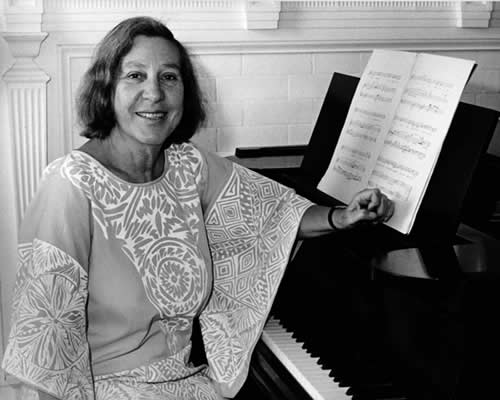

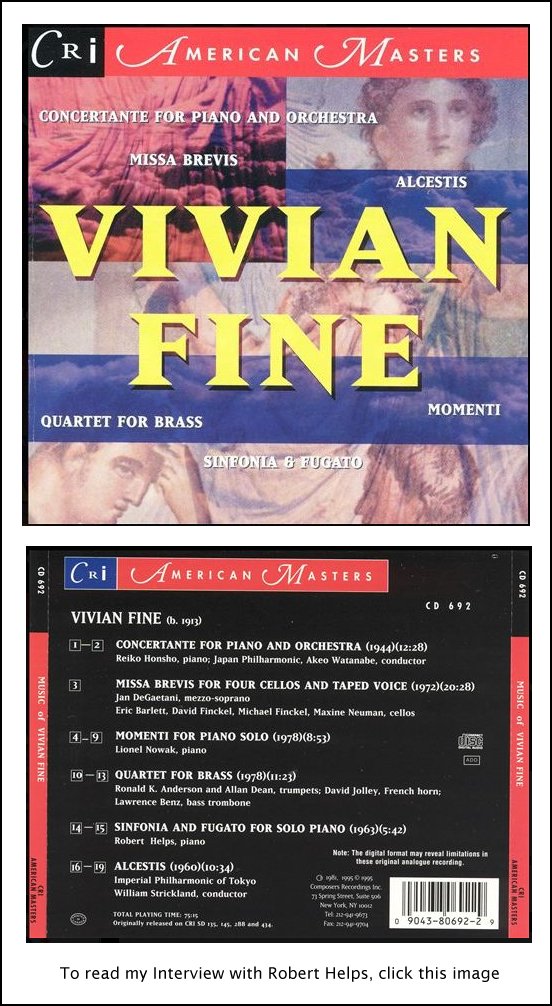 VF: Now, yes. I would say almost all the
time now, I get very good performances. There are an awful lot of gifted
people out there, and they perform my music. Actually they do music
of every repertoire, and I’ve been very lucky and happy with what I’ve heard.
VF: Now, yes. I would say almost all the
time now, I get very good performances. There are an awful lot of gifted
people out there, and they perform my music. Actually they do music
of every repertoire, and I’ve been very lucky and happy with what I’ve heard.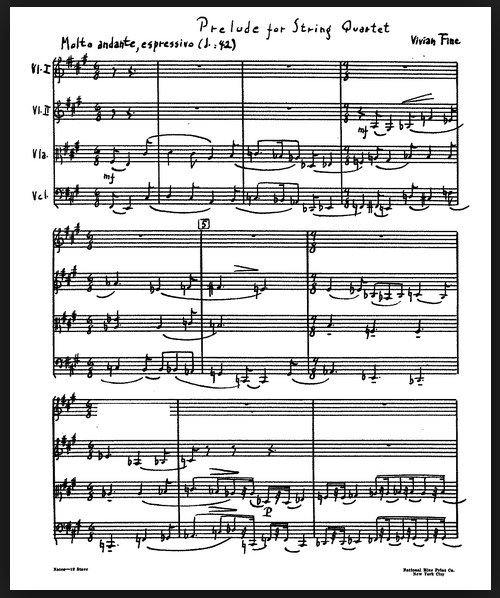 VF: That is a deliberately tonal piece. I
was writing a piece modeled after the concerti
grossi of Bach or Handel. It’s a kind of neo-baroque idiom,
and it’s a special piece. Occasionally I will still write a tonal piece
like that, but most of my other pieces, while not atonal, are freely atonal
and freely tonal at the same time.
VF: That is a deliberately tonal piece. I
was writing a piece modeled after the concerti
grossi of Bach or Handel. It’s a kind of neo-baroque idiom,
and it’s a special piece. Occasionally I will still write a tonal piece
like that, but most of my other pieces, while not atonal, are freely atonal
and freely tonal at the same time. 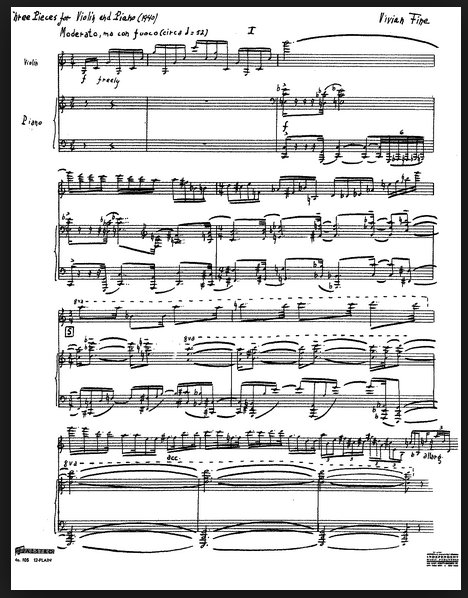 VF: Yes, and these people become the characters
in the opera. There’s also a man called the Tenor, and he plays various
roles. Sometimes he’s Emily Dickinson’s imagined lover; he’s Isadora
Duncan’s real lover; he’s Emily Dickinson’s father, or he’s Gertrude Stein’s
friend. He plays quite a number of roles in it. I put this text
together. I just had an idea one day; I was just going to do that.
I’d gotten a grant from the National Endowment for the Arts to write an opera,
and I’d originally suggested a text that I thought I could use, but I decided
I didn’t want to. So I wanted to come up with something else, and this
is what I came up with. It proved really interesting to write the work.
I took out a great many works of these people. Isadora Duncan only
had one book that she wrote, but the others have a lot of books and poems,
and I made an opera out of it. There isn’t much of a plot. There
really isn’t a plot, except that the women get to know each other through
the course of the opera.
VF: Yes, and these people become the characters
in the opera. There’s also a man called the Tenor, and he plays various
roles. Sometimes he’s Emily Dickinson’s imagined lover; he’s Isadora
Duncan’s real lover; he’s Emily Dickinson’s father, or he’s Gertrude Stein’s
friend. He plays quite a number of roles in it. I put this text
together. I just had an idea one day; I was just going to do that.
I’d gotten a grant from the National Endowment for the Arts to write an opera,
and I’d originally suggested a text that I thought I could use, but I decided
I didn’t want to. So I wanted to come up with something else, and this
is what I came up with. It proved really interesting to write the work.
I took out a great many works of these people. Isadora Duncan only
had one book that she wrote, but the others have a lot of books and poems,
and I made an opera out of it. There isn’t much of a plot. There
really isn’t a plot, except that the women get to know each other through
the course of the opera.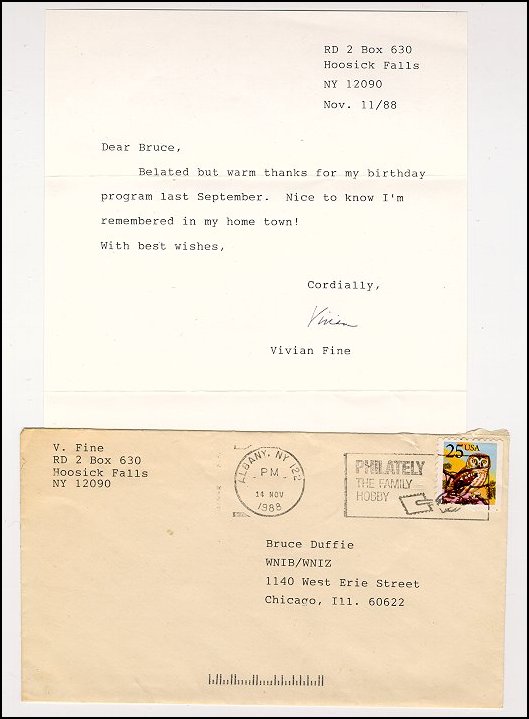 BD: So you’re looking for more inspiration than technical
perfection?
BD: So you’re looking for more inspiration than technical
perfection? Profile of Vivian Fine
By Espie Estrella, About.com Guide Born in Chicago on September 28, 1913 to David and Rose Fine Died March 20, 2000 in Bennington, VT due to vehicular accident Also Known As: Influential American female composer who was especially noted for her chamber music. She was also known for performing contemporary piano music written by composers like Aaron Copland and Charles Ives. She married Benjamin Karp, a sculptor, in 1935. Their first daughter, Margaret, was born in 1942. Type of Compositions: Her compositions include chamber music, symphonies, choral music, vocal pieces and 2 chamber operas. Influence: In 1918 she began taking piano lessons under the tutelage of her mother. At the age of 5 she entered Chicago Musical College; making her one of the youngest students to receive a scholarship there. From 1924 to 1926, she studied piano with Djane Lavoie-Herz - a former colleague of Russian composer Alexander Scriabin. She also studied harmony and composition with Ruth Crawford and counterpoint with Adolf Weidig. Other Influences: In 1929, at the age of 16, she made her professional debut with her composition "Solo for Oboe" premiering at New York's Carnegie Chamber Hall. She later studied composition with Roger Sessions (!934 to 1942), piano with Abby Whiteside (1937 to 1945) and orchestration with George Szell (1943). Notable Works: Her composition for the piano titled "Lullaby" was written when she was only 13 years old. Other works include: "Four Pieces for Two Flutes," "Four Polyphonic Pieces for Piano," "Suite in E Flat," "Concertante for Piano and Orchestra," "Capriccio for Oboe and String Trio," "String Quartet," "Duo for Flute and Viola," "The Great Wall of China," "The Race of Life," "Opus 51," "They Too Are Exiles," "Tragic Exodus" and her two chamber operas: "The Women in the Garden" and "Memoirs of Uliana Rooney." Interesting Facts: * Vivian Fine became a member of Aaron Copland’s Young Composers’ Group in 1932. * That same year, she participated in the First Yaddo Festival. * She co-founded the American Composers Alliance and became its vice-president from 1961 to 1965. * She taught at Vermont's Bennington College from 1964 to 1987. * Other schools she taught at include New York University, Juilliard School and the State University of New York at Potsdam. * From 1953 to 1960, she was artistic director of the Rothschild Foundation. More Information: * She was also a recipient of grants from several foundations including the Ford Foundation, National Endowment for the Arts, Martha Baird Rockefeller Foundation, Alice B. Ditson Foundation and Elizabeth Sprague Coolidge Foundation. * In 1979 she received an award from the American Academy and Institute of Arts and Letters. This was followed by a Guggenheim Fellowship award in 1980. * Her "Drama for Orchestra" was a runner-up for a Pulitzer Prize. For more information on Vivian Fine, visit her official website [http://vivianfine.org/]. |
This interview was recorded on the telephone on November 8, 1986.
Portions (along with recordings) were used on WNIB in 1988, 1993, and again
in 1998. A copy of the unedited audio tape has been placed in the Archive of Contemporary Music at Northwestern University. This transcription
was made and posted on this website in 2012.
To see a full list (with links) of interviews which have been transcribed and posted on this website, click here. To read my thoughts on editing these interviews for print, as well as a few other interesting observations, click here.
Award - winning broadcaster Bruce Duffie was with WNIB, Classical 97 in Chicago from 1975 until its final moment as a classical station in February of 2001. His interviews have also appeared in various magazines and journals since 1980, and he now continues his broadcast series on WNUR-FM, as well as on Contemporary Classical Internet Radio.
You are invited to visit his website for more information about his work, including selected transcripts of other interviews, plus a full list of his guests. He would also like to call your attention to the photos and information about his grandfather, who was a pioneer in the automotive field more than a century ago. You may also send him E-Mail with comments, questions and suggestions.